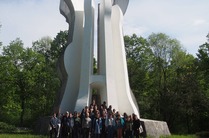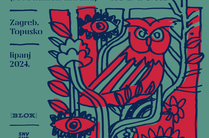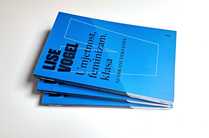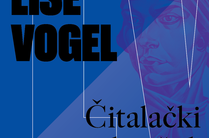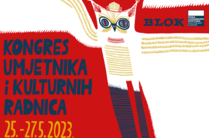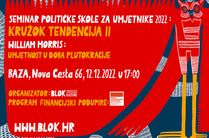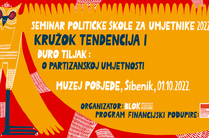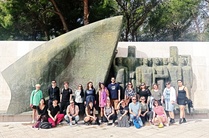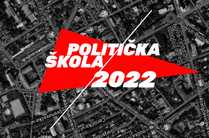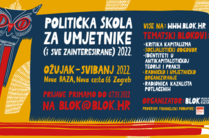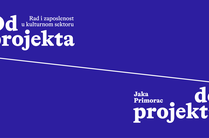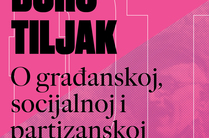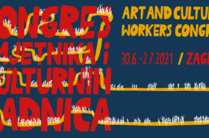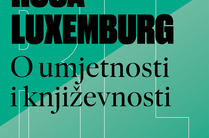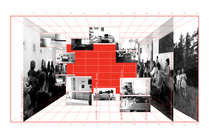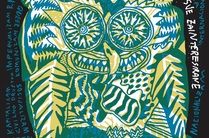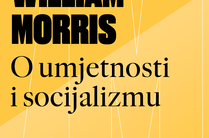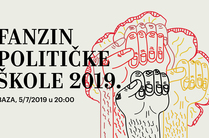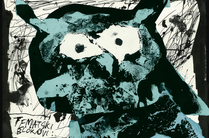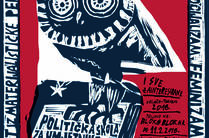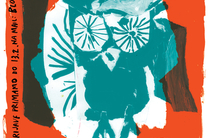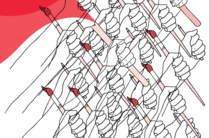ART AND CULTURAL WORKERS CONGRESS
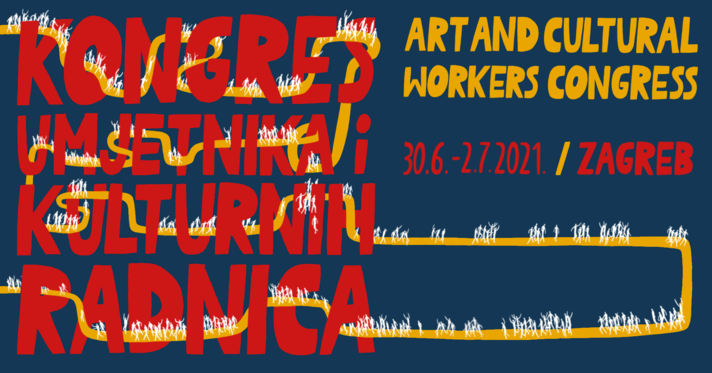
The proverbial prestige of artists and cultural workers skilfully conceals the nature of work in this field, dominated by unrecognized and unpaid work. Where, until recently, there were stable jobs, atypical forms of work prevail today, and with them a growing reserve army of cheap labor. A neoliberal invention, 'project culture' - quite contrary to the discourse in which it proclaims 'democratization' and 'decentralization' - has profoundly transformed the role of art and culture in society. The field, which was for decades partly ‘exempted’ from capitalist relations of production, is now completely subsumed in them. After a short period of the socialist cultural policies and welfare state, artists and cultural workers are now exposed to insecurity, the risk of poverty and growing exploitation. Therefore, today they urgently require mechanisms of self-regulation that will collectively enable a fairer distribution in the field, both for them, the institutions and the public.
The Art and Cultural Workers Congress brings together several international organizations, from initiatives and professional associations to trade unions active in the fight for better working conditions in the cultural field. The two working sessions are divided thematically. On the first day, we will be discussing models and options for the introduction of a fair wage. The second day will be dedicated to the issues of self-organization, the possibilities and constraints of organizational forms, as well as the opportunities and obstacles to the mass unification of precarious workers. The Congress will end with a collective discussion, and we hope it will be continued by a mutual empowerment in a common struggle.
location (for invited participants): The Croatian Film Directors' Guild, Boškovićeva 23, Zagreb
All those interested can follow the Congress program on June 30 (Wed) and July 1 (Thu) via BLOK’s YouTube channel.
The working language during the Congress will be English.
PROGRAM
Wednesday, June 30, 2021
10.00 - 10.15 __ OPENING OF THE CONGRESS
FOR A LIVING WAGE!
10.15 - 13.00
Zoë Claire Miller / berufsverband bildender künstler*innen berlin, Germany
Lidija Krienzer Radojević / IG Kultur Österreich, Austria
moderator: Vesna Vuković
15.00 - 18.00
Lise Soskolne / Working Artists and the Greater Economy (W.A.G.E.), USA
Ana Kutleša / "ZA K.R.U.H." (For BREAD), Croatia
moderator: Dunja Kučinac
Thursday, July 1, 2021
UNITED WE BARGAIN, DIVIDED WE BEG
10.00 - 13.00
Vahida Ramujkić / The Association of Fine Artists of Serbia
Corinne Mazzoli, Alessio Mazzaro / Art Workers Italia
moderator: Ana Kutleša
15.00 - 18.00
Anahi Saravia Herrera, Dora Pocsai / United Voices of the World - Designers + Cultural Workers Sector, United Kingdom
Lina Vergopoúlou, Myrto Delimikháli / Σ.Ε.ΧΩ.ΧΟ - Greek Union of Dance Workers, Greece
moderator: Vesna Vuković
Friday, July 2, 2021
10.00 - 13.00 __ ASSEMBLY
general discussion and closure of the congress
*FOLLOW-UP PROGRAM*
Wednesday, July 7, 2021
11.00 - 12.30
Nova BAZA, Nova cesta 66
Jaka Primorac: On project based cultural production and cultural policies
research presentation with discussion
(Due to the epidemiological situation, the number of participants is limited, so please announce your arrival via email blok@blok.hr by 4 p.m. on the 5th of July at the latest).
Friday, July 9, 2021
11.00 - 12.30
Nova BAZA, Nova cesta 66
Đuro Tiljak: On bourgeois, social and partisan art
reading group
(Due to the epidemiological situation, the number of participants is limited, so please announce your arrival via email blok@blok.hr by 4 p.m. on the 8th of July at the latest).
ABOUT PARTICIPANTS:
The BERUFSVERBAND BILDENDER KÜNSTLER*INNEN BERLIN (professional association of visual artists of Berlin) was founded in 1950 and today has over 2500 members, whose membership fees fund its independent work. It was conceived as an association for the protection and enforcement of visual artists' economic and social interests. From the very beginning, it has advocated for improved social security for artists and the simultaneous expansion of their opportunities to exhibit their works.
One focus of the association is supporting all visual artists by providing infrastructure and means of production for artistic work. The bbk berlin enables this through its non-profit subsidiaries, which provide affordable studios, sculpture, print and media workshops and educational opportunities for artists.The association is also active in cultural policy, taking a position on issues concerning the working conditions and position of artists in society, advising policymakers in the interest of artists, and advocating on behalf of the cultural, economic, legal and social interests of artists vis-à-vis the public, media and policymakers. Since 2004 the bbk berlin has no longer been a member of the national artist's association of Germany, and so also represents the interests of artists on a national level, as well as engaging in exchange with international artists' organizations. Due to the bbk berlin's efforts, the "Berlin Model" of artist fees was introduced in 2016 and has since inspired similar models in other cities. The Berlin Model consists of a special fund anchored in the Berlin state budget, from which municipal galleries receive funds especially for the purpose of paying artist fees according to a scale of minimum fees, which range from 1500€ for solo shows to 100€ for group shows with many artists. The minimum fee guidelines are enforced in all shows funded by Berlin, not only the shows in municipal galleries.
IG KULTUR ÖSTERREICH is a cultural-political advocacy association that brings together about 1000 autonomous cultural initiatives at the national level. Together with advocacy associations at the national level, it negotiates framework conditions on behalf of its members and sets cultural-political standards. IG Kultur represents cultural initiatives that operate independently and continuously in the field of contemporary cultural production and mediation. The central task of IG Kultur Österreich is to improve the working conditions for emancipatory cultural work. The key functions of the association are: influence at the (cultural) political level, counseling and education of cultural workers, and production, acquisition and distribution of knowledge.
In response to the fact that precarious work and atypical labor relations in the cultural field are being normalized, IG Kultur started the "Fair Pay for work in culture" campaign ten years ago. For this purpose, directives have been drawn up for fees for different jobs and a scale of fees for five different tariff classes. The compensation scale relies on salaries for comparable work, titles and functions. The team ensures transparency and visibility of cultural activities. Fair Pay calls for active political action towards fairer pay, which will reduce income inequalities in the field. The current crisis has further aggravated working conditions for already low-paid freelancers, thus deepening existing inequalities in the field. Such development threatens the preservation of the diversity of the cultural landscape.
WORKING ARTISTS AND THE GREATER ECONOMY (W.A.G.E.) is a New York-based activist organization founded in 2008. Its mission is to establish sustainable economic relationships between artists and the institutions that contract their labor, and to introduce mechanisms for self-regulation into the art field that collectively bring about a more equitable distribution of its economy. Since 2014 W.A.G.E. has operated W.A.G.E. Certification, a national program that publicly recognizes those nonprofit arts organizations demonstrating a history of, and commitment to, voluntarily paying artist fees that meet its minimum payment standards. To date, over $8 million has been paid out to artists through the program's administration. In 2018 W.A.G.E launched WAGENCY, an artists' solidarity union that facilitates the fair remuneration of labor in the nonprofit sector. Supplying artists with digital tools and the necessary collective agency to negotiate W.A.G.E. fees or withhold content when not paid them, WAGENCY is a new model for organizing an unpaid workforce in an unregulated field. W.A.G.E. is currently developing a series of work agreements for engaging the non-unionized freelance labor of those who facilitate the conception, fabrication, production, exhibition and circulation of art. Scheduled to launch in October, 2021.
The "ZA K.R.U.H." (For BREAD) Platform gathers cultural workers and artists in a joint fight for decent working conditions and sustainable public funding for culture, as the only mechanism that can ensure its widest possible availability, and provide the dignity of work in the field of culture. Drawing on numerous historical and recent fights, the platform was launched in 2020 by the Local Base for Culture Refreshment BLOK, the Centre for Drama Arts CDU, the co-authorship initiative OOUR, the association for literature and culture Skribonauti, and the artistic organization Atelijeri Žitnjak (Žitnjak Studios), as a continuation of the ENOUGH WITH THE CUTS! initiative. This initiative was undertaken by a broad and united front of cultural and media workers who have demanded from the Croatian Ministry of Culture an end to drops in public funding for culture, an increase in culture budget and greater transparency in allocating public funds, workplace and social protection of all who work in the field of cultural and artistic production, sustainable and developing cultural infrastructure, and public financing of non-profit media.
Our fight for bread has begun quite unexpectedly in the year of the pandemic, which has revealed in full the misery of cultural production in shackles of its project financing, and left us without economic, social, and health security. Consequently, in 2020, we requested from the Croatian Ministry of Culture to urgently implement a basic income for all cultural workers, not only during the pandemic, but also as a measure of permanent protection of cultural production. We continue our fight for bread in 2021, by establishing a Protocol for fair remuneration for artistic and cultural work, and by introducing self-regulation mechanisms, in order to achieve greater economic equality between us and those that contract us, as well as open up space for a fairer cultural production and distribution.
THE ASSOCIATION OF FINE ARTISTS OF SERBIA (ULUS), as the successor to the Association of Fine Artists (ULU) founded in 1919, is one of the oldest and most numerous associations of citizens in the region. The original reasons for establishing the association of artists more than a century ago were to resolve the professional and status issues of artists in society. This significantly differentiated ULU from other artistic associations of the period, that joined solely by artistic affinities. Today, ULUS has more than 2500 members, of which more than 550 have the status of independent artists.
ULUS, as a professional association of artists active in the territory of the Republic of Serbia, accomplishes its mission in promoting and protecting the working and professional rights and interests of visual artists, securing their better social standing and accordingly securing a better position for visual art in society, raising the quality of artistic production, organizing a reference and representative art program. In order to achieve its basic goals, ULUS is engaged in establishing cooperation with other related associations and organizations, institutes and partners in the country and abroad, as well as, with business entities, funds and local institutions.
ULUS has acquired the status of the representative association in the culture, on the basis of which the Ministry of culture covers funds for entrusted affairs on data records of the independent artists.
AWI - ART WORKERS ITALIA (f. 2020) is the first organization in Italy founded with the aim of giving voice to contemporary art workers. AWI is a grassroots, autonomous and non-partisan association that collaborates with experts to build ethical, contractual, and legal tools to protect art workers. AWI operates in coordination with other initiatives in Italy and abroad, and in solidarity with all precarious workers, to reform the sector and make it more inclusive, sustainable, and transparent. AWI acts towards the recognition of work and its regulation, the redistribution of resources, and the eradication of all forms of exploitation.
DESIGNERS & CULTURAL WORKERS is a sector of United Voices of the World, a grassroots, anti-racist, non-hierarchal and member-led, direct action and campaigning trade union that exists to support and empower the most vulnerable groups of precarious, low-paid workers. Our aim as a union is to tackle the individualisation of work-related issues: it doesn’t matter whether problems are experienced in a workplace or while working freelance. We must recognise that our problems are shared, make connections between atomised workers, educate and support each other.
As UVW-DCW, we educate ourselves about our rights at work and campaign to transform our industry. DCW acts as a member support network: we support one another to find solutions to the problems we face and look for solutions collectively. There is no sense of good practice in our sector, in terms of fees, contracts, workplace environment, freelancing and so on. We want to undertake the research work to determine what just working practices look like for our members.
Σ.Ε.ΧΩ.ΧΟ -THE GREEK UNION OF DANCE WORKERS is the primary collective body of all those who work in the field of dance, as teachers, dancers, choreographers. It was founded in 2008 through processes of conversation and meetings between some dancers about the struggles of our profession. And so, the initiative became a decision, the decision set us in motion and the motion became our Association and it is here with approximately 500 members. Although it is only 13 years since its foundation, its presence is dynamic and it intensively protects the rights of workers in the field of dance.
With constant presence in consultations on culture and education, we submit proposals and demands to ministries, we prepare draft laws, in some cases we move legally, we organise actions of institutional advocacy, we strike and demonstrate together with other artistic unions and organisations.
Our main axis is the triptych collectivity-fraternity-solidarity.
organiser: BLOK
with the support of The Croatian Film Directors' Guild
illustration and design: Klara Rusan
The program is financially supported by the Rosa Luxemburg Stiftung Southeast Europe.
The BAZA’s annual program is supported by the "Kultura Nova" Foundation.
